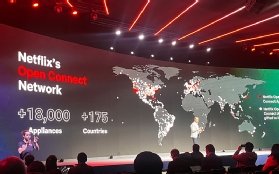
fredmantel - stock.adobe.com
MWC 2023: Netflix pushes back against telcos in net neutrality row
Net neutrality seems to be an itch the European comms industry cannot scratch, and hot on the heels of an intention to get content firms to contribute to the build-out of networks for tomorrow’s services, Netflix takes aim at telcos’ demands
Leading video firm Netflix has hit back against telcos and politicians in what could be just the opening shots in a brewing net neutrality battle as to who will foot the bill to develop the next-generation communications infrastructures that Europe’s businesses and homes will rely on.
This comes less than a week after the European Commission (EC) outlined a raft of proposals, including regulation designed to put forward new rules to enable a faster, cheaper and more-effective roll-out of gigabit networks across the European Union.
On 24 February, the EC revealed a new set of regulations consisting of a proposal for a Gigabit Infrastructure Act and a draft Gigabit Recommendation, which seeks to provide guidance to national regulatory authorities on the conditions of access to telecoms networks of operators with significant market power, to incentivise faster switch-off of legacy technologies and accelerate the deployment of gigabit networks. The announcement was generally welcomed by the communications industry, in particular global mobile trade association GSMA.
Just three days later, in a keynote speech immediately after the world’s leading mobile trade show MWC opened its doors, EC internal market commissioner Thierry Breton joined Telefónica chairman and CEO José María Álvarez-Pallete to look at how the shift in innovation enabled by artificial intelligence, 5G and augmented reality has set the industry on a new trajectory – one that is both immersive and inclusive – and who would pay to create this brave new world.
Breton welcomed the new world and the prospects for Europe, but warned that despite the massive advances being made in the European communications sector, the region’s current networks were not fully prepared for the anticipated traffic growth due to the uptick in applications such as immersive experiences and video streaming.
As he continued with his theme, Breton hinted very clearly that the funding required to build out these next-generation networks should involve all actors in the ecosystem, in particular the tech giants such as Google, Meta and Netflix whose services were the primary drivers of this growth. For his part, Álvarez-Pallete demanded that all stakeholders needed to pay their “fair share” when it came to building tomorrow’s infrastructure.
Taking to the same stage a day later, Netflix co-CEO Greg Peters defended the role companies like his play, claiming that the subscription TV and film firm’s content drives people to pay for better broadband services.

In his keynote, Peters struck back, noting that growing demand for the internet did not cause growing traffic costs. He said there was a very clear and correct symbiotic relationship between a thriving creative industry and a thriving internet ecosystem, and that was due to people wanting to watch great films and TV shows and being willing to pay for high-quality internet service to enjoy the content they love.
“I know there are some here today that are concerned that this consumer demand leads to unsustainable internet traffic growth. These concerns are not new,” he told the audience at MWC.
“I remember being here in Europe about 10 years ago, talking to our partners and regulators about the same concerns, but the last decade has shown – and telco leaders have recently affirmed – that growing internet usage is actually a huge opportunity. It reflects the growing demand for the services that we all provide together,” added Peters.
“Of course, increasing usage requires investment. For our part, Netflix has invested over $60bn in content over the last five years. That’s equivalent to roughly 50% of all of our revenue in that timeframe. That is the part we play in creating this virtual, slightly better, more varied content, leading to more people willing to pay for better broadband services.”
Going forward, Peters said that as national broadcasters shift from linear to streaming services, Netflix wanted a system in place that would encourage more investment in hit video services, but that taxing content firms would be detrimental to network development. He described such payments as a double-whammy for the industry.
“Some of our ISP partners have proposed taxing entertainment companies to subsidise their network infrastructure. But as commissioner Breton said yesterday, and as I very much believe, it shouldn’t be a binary choice between big telco or entertainment companies,” he added.
“This is because a tax like that would have a significant adverse effect. It would reduce investment in content, which hurts local creative communities. It hurts the attractiveness of high-priced broadband packages and, ultimately, it hurts consumers.
“But as broadcasters continue to shift away from linear to streaming, they will start to generate significant amounts of internet traffic as well… Broadband customers who drive this increased usage already pay for the development of the network through their subscription fees. That’s the service they’re buying when they sign up to an ISP. Requiring entertainment companies, both streamers and broadcasters, to pay more on top of that would mean that ISPs, effectively, are charging twice for the same infrastructure… There is no suggestion that these levies would be passed on to consumers in the form of lower prices or better infrastructure.”
As he made his case, Peters pointedly noted that Netflix’s operating margins were significantly lower than either British Telecom or Deutsche Telekom and that Netflix could “just as easily argue” that network operators should pay entertainment companies to help with the cost of content, which was what happened under the old TV model.
Peters suggested that a better approach was for entertainment companies and operators to focus on what they both do best, and through that, create “a rising tide that lifts all boats”.
Read more about net neutrality
- UK net neutrality regulation failing all stakeholders: Analyst releases study showing net neutrality regulation is failing consumers, innovators and investors, calling for evidence-based broadband policy.
-
Virgin to focus on business net as providers welcome new net neutrality debate: Network providers call on UK government and regulators to adopt net neutrality regulations to align with new times in the communications industry as leading cableco announces a pivot to B2B.
Streaming surges see BT chief call for new net neutrality regulations: Marc Allera demands action on fairness in internet carriage as Amazon-hosted Premier League football drives new peak in traffic, 12% above previous high.










